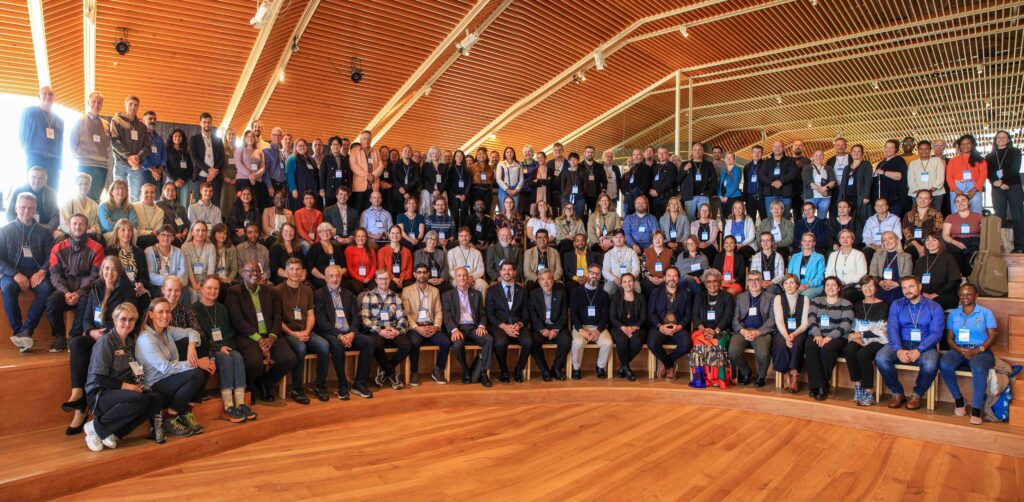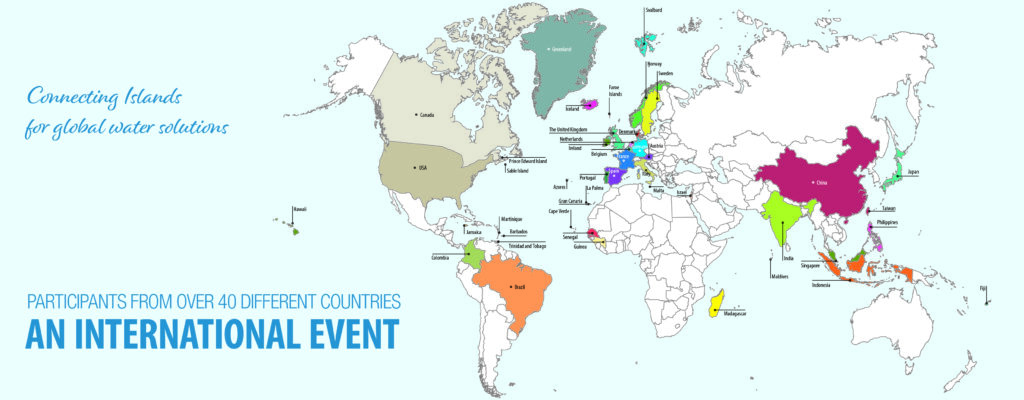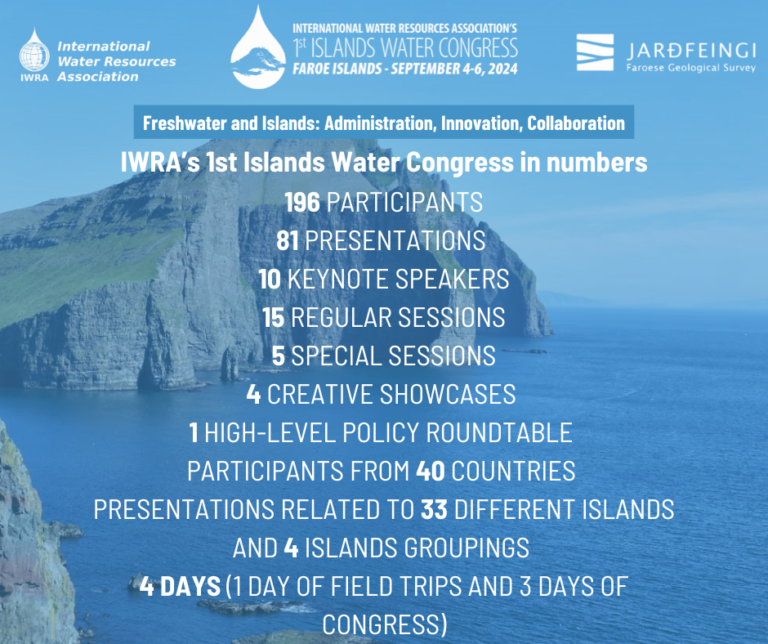conclusion

The International Water Resources Association (IWRA) recently concluded its 1st Islands Water Congress, held from 4-6 September at the Nordic House in Tórshavn, Faroe Islands. Hosted by Jarðfeingi (the Faroese Geological Survey), this flagship event provided a platform for critical insights into the distinct challenges and opportunities surrounding freshwater water management on islands. Bringing together global experts, decision-makers, and island communities from 40 countries, the Congress offered a comprehensive look into how islands can take the lead in addressing some of the world’s most pressing water issues.
Overarching Key messages from IWRA’s 1st Islands Water Congress hosted by the Faroese Geological Survey (Jarðfeingi)
Collaboration is Essential: Islands share common challenges in water management, and collaboration across regions is key to overcoming these issues. Islands can lead the way showcasing innovation, with lessons that sometimes can be applied globally.
Water Management is Complex: Water is not only a technical resource, but also deeply intertwined with cultural, political, and emotional factors. Effective policies need to reflect these dimensions to meet the needs of island communities.
Climate Resilience is Critical: Climate change poses a significant threat to island freshwater resources. Building resilience through adaptive policies and infrastructure is a priority for island communities.
The Water-Energy Nexus: Addressing the interconnection between water and energy is vital for the sustainability of island societies and their ecosystems. Efficient technologies and renewable energy sources must be integrated into water management strategies.
Data-Driven Decision Making: Monitoring is essential for managing groundwater and freshwater resources, but data collection should be purposeful and targeted to address specific needs and challenges. It also needs to be transparent in order to build trust and confidence in the management of freshwater.
Public Awareness and Engagement: Educating the public about water conservation and the processes behind water management is crucial for fostering sustainable practices. Communities need to understand the value and cost of water resources.
Institutional and Regulatory Frameworks: There is no one size fits all model of institutional and regulatory framework. On some islands, having a strong, centralised framework law will be effective. On others, freshwater management can be reflected in a layer of laws and regulations. What is important is that those in charge of the laws and their implementation have the necessary political and institutional coordination.
Innovation and Adaptation: Islands can lead the way in innovation by applying lessons from other regions and adapting them to their unique contexts. They are ideal testing grounds for sustainable solutions, but must avoid being seen merely as “laboratories”.
International Knowledge Sharing: Despite differences in geography and economy, islands can benefit from sharing knowledge and best practices, especially in areas like renewable energy and freshwater management.
Resolutions and Commitments

1. Faroe Islands and Prince Edward Island signed a Memorandum of Understanding Establishing the Torshavn Dialogue on Sustainable Freshwater Management on Islands. The Parties of the MoU will contribute to ongoing international processes in the field of freshwater management relevant both directly or indirectly to islands, they will exchange good practices and identify concrete actions and possible investments in the field of sustainable freshwater. Both Parties are keen to attract other islands to the MoU starting with Malta, which has already started the internal procedures to join the MoU.
2. The IWRA Islands Water Task Force will be established to maintain engagement and collaboration among participants to the Congress Series and through them their island communities. It will also coordinate input into IWRA’s next World Water Congress from an island dimension.
5. The Congress highlighted the importance of addressing the economic and financial aspects of water management, with a focus on involving the industry sector in future discussions.
3. A legal expert group composed of relevant members of the Congress ISC will continue to support and advise the Faroe Islands in their process of revising their water law legislation and regulation.
4. Two special issues of the Water International and Island Studies Journals are being planned, bringing together a selected number of papers from the Congress.
Main Congress Output
One of the Congress’ main outputs will be the IWRA Islands Water Congress Policy Report, scheduled to be released in early 2025. This report will focus on regulation and will share policy recommendations aimed at the Faroe Islands, as well as good practices coming from other islands. Ultimately, this report along with the 1st Islands Water Congress has triggered discussions towards a potential new water law in the Faroe Islands to be approved by the Parliament in 2025. Once the report is published, participants are encouraged to share the report with their governments, wider freshwater local stakeholders including local communities. Participants of the 1st IWRA Islands Water Congress are encouraged to attend IWRA’s upcoming XIX World Water Congress in 2025 and to bring to it a unique island perspective.

Latest News:
- Historic MoU signed between the Faroe Islands and Prince Edward Island
- Post-Congress Highlight newsletter
- Detailed Congress Programme
- Final Congress report
Thank everyone who made this event possible—our hosts, the Faroese Geological Survey (Jarðfeingi), the International Scientific Community members, IWRA Executive Board Members and Executive Office, Keynote speakers and presenters, sponsors, rapporteurs, and volunteers. Your collective efforts and contributions have made the 1st Islands Water Congress a success, and we look forward to continuing our journey toward sustainable water management on islands together.